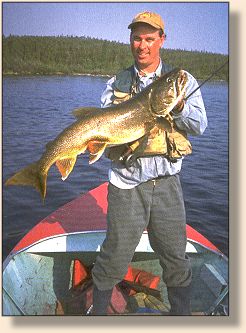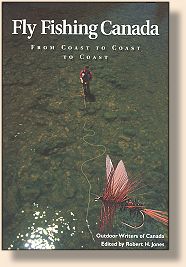Wind Blowing? Start Trolling!
By Robert H. Jones
From Fly Fishing Canada, Published by Johnson Borman Publishers
Casting flies with a well balanced outfit is one of
life's joys, especially when the fish are cooperating.
However, when the wind starts blowing, pleasure
decreases in direct proportion to its speed and intensity.
You have two choices: give up or troll.
If you opt for the latter, select patterns with bulk,
like leeches or dragonfly nymphs. Two standby patterns
are the Woolly Worm in black, "muddy" maroon, olive-green,
plus the Carey Special in various color combinations. I favor
peacock herl body with a hackle of blue-phase pheasant
rump feather. Simple, easy to tie and effective.

If the lake contains Blackwater or Tzenzaicut strain
rainbows, cutthroat trout, Dolly Varden or bull trout,
bear in mind that all are meat eaters, preferring small
fish to aquatic insects or invertebrates. Use streamer
patterns that represent shinners, sticklebacks, sculpins,
or juvenile suckers, squawfish or salmonides - whichever
are most common. Dependable patterns usually incorporate
a silver body with a light-colored hair underwing, darker-colored
top wing, and a few strands of Krystal Flash or Flashabou. An
exception is the Muddler Minnow and its many offspring - sculpin
imitations that use natural-colored turkey wing and deer hair.
As all of these critters are found close to the bottom, a full-sink
line is a better choice than a sink-tip. In most cases, a 9' leader
is sufficient.
Seek areas offering protection from the wind's direct force - behind
an island or in the lee of a peninsula or irregular shoreline.

Trolling without a motor may pose problems while fishing alone
and lacking a rod holder because you need both hands free to row
or paddle (I like the Scotty 265 Fly Rod Holder). Place the rod
handle on the the deck between the feet,with the reel handles
facing upward and the rod tip hanging straight back over the
stern. Set the reel's drag lightly and depend on the ratchet
to prevent overruns. This allows you to row slowly or control
the drift as required. Don't worry about setting the hook if a
fish hits - in most cases the boat's momentum will do the job.
No, it isn't fly fishing in the true sense, but it beats not
fishing at all. ~ Robert H. Jones
Brings out the natural flavor
(Makes four servings)
1 large or 4 small pan-sized trout
2 tbsp - olive oil - 30 mL
1/2 - 1 cup - each chopped onion, carrot and celery - 125 - 250 mL
1 - 2 cups - liquid (white wine, fish stock, water) - 250 - 500 mL
(or 50/50 wine and water)
Salt and pepper to taste
2 sprigs - fresh herbs (thyme, dill or tarragon)
1 lemon, thinly sliced
1. Clean fish, wash and pat dry.
2. Heat olive in poacher. Saute vegetables in oil for
5 minutes, add liquid and bring to a slow simmer.
3. Season inside of trout with salt and pepper to taste;
then place on rack. With a slotted spoon, remove some
vegetables from the stock and place in the cavity, adding
some thyme and lemon slices. Place a few lemon slices on
top of the trout, and add remainder to the stock. Lower
rack into stock and cover poacher. Bring to a simmer (never
boil) and poach until fish is opaque. This method takes
somewhat longer to cook fish, so check often by probing
at the thickest part.
4. Remove rack and carefully transfer tout to a large
plate. While fish is still hot, remove skin from the top
side only. Remove and discard vegetable stuffing from the
cavity. Place trout on a platter and garnish with herbs and
fresh lemon slices.
5. Serve with a simple mayonnaise sauce made from fresh
minced dill (tarragon, or chives) with lemon juice and
mayonnaise. Thin with white wine if required. A dash
of hot sauce helps heighten flavors.
(If lacking a fish poacher, use a roasting pan with a rack.)
~ Wayne Phillips
|
Credits: From Fly Fishing Canada, From Coast to Coast to Coast,
By Outdoor Writers of Canada, Published by Johnson Gorman Publishers.
We appreciate use permission!
Our Man In Canada Archives
|

